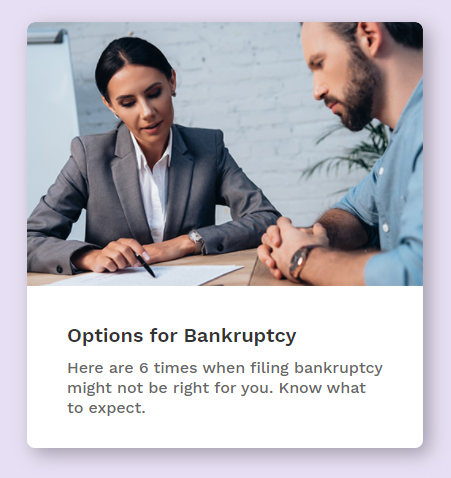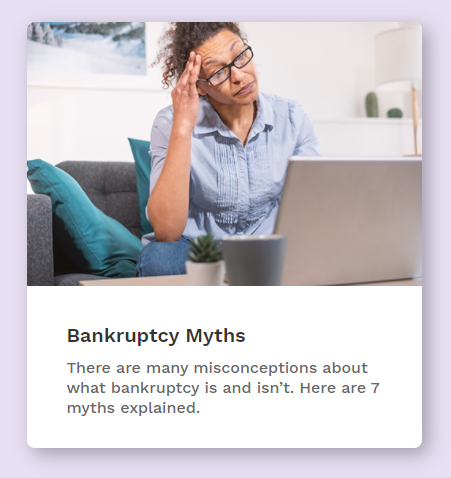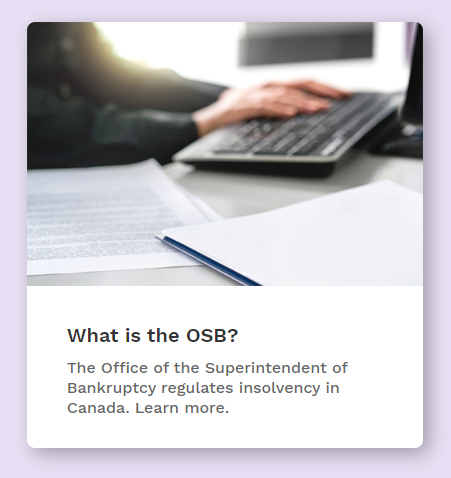Is Bankruptcy Really Your Only Choice?
When facing serious financial difficulty, declaring bankruptcy is often the first thing that comes to mind. However, filing for bankruptcy is a big decision that needs to be explored carefully as it can affect your credit and job opportunities for years to come. Fortunately, between financial difficulty and bankruptcy there are a lot of options, and our credit counsellors are experts at helping people explore these options. Get the full picture on bankruptcy and its alternatives before making a choice that could impact your life in more ways than you expect.
Alternatives to Bankruptcy
When to Consider Bankruptcy
Avoid filing bankruptcy, consider declaring bankruptcy only when all other options for dealing with your debt have been exhausted. That means you:
- Cannot afford to repay the debt within a reasonable period of time
- Cannot repay your debt by selling your assets
- Don’t qualify for or don’t wish to start a debt management program
- Don’t qualify for or don’t want to get a debt consolidation loan
- Have been declined for or don’t want to file a consumer proposal
- Owe the government money for debts that can be included in a bankruptcy
- Have assets or income that could be in jeopardy if you don’t deal with your debt problems
If you haven’t yet considered all of the above options, please do so before committing to bankruptcy, if nothing else works, then it is an option that you can always fall back on. If you would like assistance understanding all your debt repayment options and avoid bankruptcy, give us a call and we’ll be happy to help.

I honestly didn’t know what to do
I’m so grateful for the help of The Credit Counselling Society. I honestly didn’t know what to do. I got myself in debt way more than I could handle. And it’s nice to know that I’m paying off my debt with their help rather than claiming bankruptcy. Thank you so much everybody that spoke with me at credit counselling.
Tammy
Filing for Personal Bankruptcy in Canada
Filing for bankruptcy in Canada is a legal process. The goal is to help you deal with your debts and the process is governed by the Bankruptcy and Insolvency Act. When you file bankruptcy, a licensed insolvency trustee in your province will fill out the forms, do the paperwork, and guide you through the 9-21 month process. If this is your second time filing bankruptcy, the process can take up to 36 months.
How Bankruptcies Work in Canada
When you declare bankruptcy, all collection activity on your debts is stopped and your creditors will accept new payment terms according to the court approved bankruptcy agreement. However, this only works for unsecured debt, which is debt that you haven’t put up collateral for. Secured debts are not included in bankruptcy.
What Happens to Your Assets and Income
However, if you have a certain amount of equity in assets such as a vehicle or your home, your trustee will need to sell those assets and use the funds towards paying your creditors as part of your bankruptcy process. If you can afford it, you’re also able to “buy back” your assets, which means paying the value that’s above what you’re allowed to keep to your trustee.
Other assets that can be lost in bankruptcy include RESPs, tax refunds, RRSP contributions for the past 12 months, and other valuables. Every province has a list of bankruptcy exemptions, which are the things that you get to keep. These can include business tools and household effects up to a certain value.
Bankruptcy also restricts your income. Depending on your family size and makeup, 50% of all money you earn over a certain amount must be paid each month to your trustee, who will eventually disburse it to your creditors.
Who Qualifies to File for Bankruptcy?
A particular group of people can file for bankruptcy. These include people with an inability to repay their debts. It is assessed by taking into account the assets, means tests, income value, expenses, and pending obligations of people. It can be filed by people who have a regular source of income but wish to restructure their debts. In Canada, individuals facing insolvency with a regular income can file for bankruptcy under the Bankruptcy and Insolvency Act. Individuals must have sufficient income to initiate a repayment plan. In addition, it’s always a better idea to consult an attorney.
Bankruptcy Pros and Cons
While declaring bankruptcy can help you by giving you an opportunity to have a new financial start by getting rid of eligible debts and securing relief from overburdened financial liabilities, it also keeps debt collectors from initiating harsh actions against you. It provides you the time to restructure your financial situation. Drawbacks include the drastic decline of your credit score and loss of assets through the process of liquidation. It also prevents you from getting any form of credit for years to come. Therefore, bankruptcy is a serious matter that must be dealt with through professional help and expert assistance.
10 Steps to Filing Bankruptcy
- Figure out if you need to declare personal bankruptcy.
- File paperwork with a licensed insolvency trustee.
- Your assets will be sold.
- Creditors are told about your bankruptcy.
- A creditor meeting may be called.
- If necessary, you’ll meet an officer from the Office of the Superintendent of Bankruptcy (OSB).
- You’ll attend 2 bankruptcy counselling sessions.
- Your trustee will petition the OSB to approve or deny your bankruptcy discharge.
- Your bankruptcy is discharged either automatically or according to a court ruling.
- Your life after bankruptcy begins.
Debts That Bankruptcy Won’t Get Rid Of
Most people think that filing for bankruptcy will take care of all their debts, but that isn’t true for everyone. Beyond the difference between how secured and unsecured debts are treated, there are debts that are legally excluded from a filing. These include:
- Money you owe for child support
- Money you owe for spousal support
- Court-ordered fines
- Debts that arise due to fraudulent activity
- Government issued student loans less than 7 years old (with some exceptions)
- Certain government overpayments
If any of the debts you want to get rid of are on this list, bankruptcy might not be your best option. Review all the alternatives to bankruptcy with a non-profit credit counsellor to find the best path forward.
Need some questions answered?
Wondering if bankruptcy is for you?
If you feel that your situation is so bad that you may need to declare bankruptcy, don’t worry. You’re not alone. This is how a lot of people feel when they don’t see any light at the end of the tunnel.
Fortunately, for many people who feel this way, there are other less severe options. Speak with one of our credit counsellors to learn all your options. They’ll be happy to carefully review your whole financial situation with you and answer any questions you may have. Speaking with our certified counsellors is always free, confidential and without any obligation. We’re here to help.
True Cost of Bankruptcy
When you already don’t have enough money to pay your bills, you might wonder why it costs so much to go bankrupt. Fees include around $1,800 to your trustee for administrative, court, and filing expenses. However, the cost of bankruptcy also includes:
- If you have surplus income or assets, those amounts will need to be paid to your trustee as well.
- You’ll need to maintain payments on your secured debts if you keep those assets.
- Your credit rating will be greatly damaged for 7-9 years.
- You’ll have to report your income and expenses to your trustee each month throughout the bankruptcy process, and they will file your income tax returns and keep any refunds you’re due.
- Your bankruptcy will be a matter of public record, limiting your ability to work in certain fields and be bonded. If you belong to a professional association, they may require you to inform them and then decide if you can remain a member. It can also affect your ability to be self-employed or hold any position of trust.
Once you sign the bankruptcy paperwork, it’s nearly impossible to back out and change your mind. For all these reasons and more, make sure that bankruptcy is truly the best option for you. We can help you figure out your best options for free, and if bankruptcy turns out to be the best way to go, we can refer you to a reputable trustee in your area.

I was so relieved after our first conversation
Sam
Discover your options
Between financial difficulty and bankruptcy are many options. Our credit counsellors specialize in helping you explore your options and alternatives to discover which one will work best for you.
Get the clarity you need.
Speak with a non-profit credit counsellor.
Between financial difficulty and bankruptcy are many options. At a time like this, it can be helpful to sit down with a knowledgeable credit counsellor who can talk through all your options and make a plan to resolve your difficulties. Once you can see your way out, you can regain your peace of mind and move forward with confidence.
Get Some Help – It’s Free
Get a free appointment to explore your options and get back on track.
Related Topics

Options for Bankruptcy
Here are 6 times when filing bankruptcy might not be right for you. Know what to expect.

Bankruptcy Myths
There are many misconceptions about what bankruptcy is and isn’t. Here are 7 myths explained.

What is the OSB?
The Office of the Superintendent of Bankruptcy regulates insolvency in Canada. Learn more.
Was this page helpful?
Thanks for letting us know.









